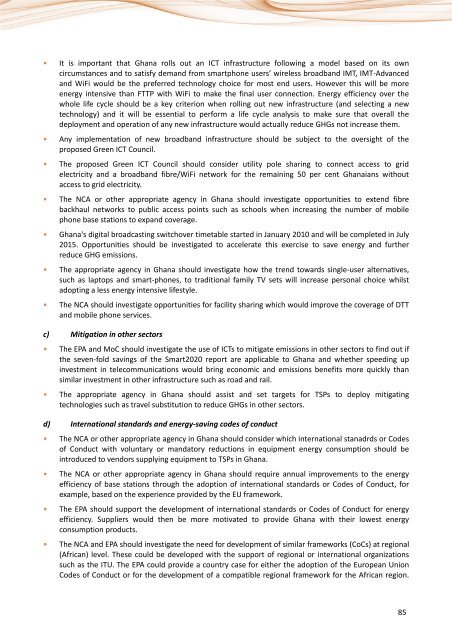Information and communication technologies (ICTs) and ... - ITU
Information and communication technologies (ICTs) and ... - ITU
Information and communication technologies (ICTs) and ... - ITU
Create successful ePaper yourself
Turn your PDF publications into a flip-book with our unique Google optimized e-Paper software.
• It is important that Ghana rolls out an ICT infrastructure following a model based on its own<br />
circumstances <strong>and</strong> to satisfy dem<strong>and</strong> from smartphone users’ wireless broadb<strong>and</strong> IMT, IMT-Advanced<br />
<strong>and</strong> WiFi would be the preferred technology choice for most end users. However this will be more<br />
energy intensive than FTTP with WiFi to make the final user connection. Energy efficiency over the<br />
whole life cycle should be a key criterion when rolling out new infrastructure (<strong>and</strong> selecting a new<br />
technology) <strong>and</strong> it will be essential to perform a life cycle analysis to make sure that overall the<br />
deployment <strong>and</strong> operation of any new infrastructure would actually reduce GHGs not increase them.<br />
• Any implementation of new broadb<strong>and</strong> infrastructure should be subject to the oversight of the<br />
proposed Green ICT Council.<br />
• The proposed Green ICT Council should consider utility pole sharing to connect access to grid<br />
electricity <strong>and</strong> a broadb<strong>and</strong> fibre/WiFi network for the remaining 50 per cent Ghanaians without<br />
access to grid electricity.<br />
• The NCA or other appropriate agency in Ghana should investigate opportunities to extend fibre<br />
backhaul networks to public access points such as schools when increasing the number of mobile<br />
phone base stations to exp<strong>and</strong> coverage.<br />
• Ghana's digital broadcasting switchover timetable started in January 2010 <strong>and</strong> will be completed in July<br />
2015. Opportunities should be investigated to accelerate this exercise to save energy <strong>and</strong> further<br />
reduce GHG emissions.<br />
• The appropriate agency in Ghana should investigate how the trend towards single-user alternatives,<br />
such as laptops <strong>and</strong> smart-phones, to traditional family TV sets will increase personal choice whilst<br />
adopting a less energy intensive lifestyle.<br />
• The NCA should investigate opportunities for facility sharing which would improve the coverage of DTT<br />
<strong>and</strong> mobile phone services.<br />
c) Mitigation in other sectors<br />
• The EPA <strong>and</strong> MoC should investigate the use of <strong>ICTs</strong> to mitigate emissions in other sectors to find out if<br />
the seven-fold savings of the Smart2020 report are applicable to Ghana <strong>and</strong> whether speeding up<br />
investment in tele<strong>communication</strong>s would bring economic <strong>and</strong> emissions benefits more quickly than<br />
similar investment in other infrastructure such as road <strong>and</strong> rail.<br />
• The appropriate agency in Ghana should assist <strong>and</strong> set targets for TSPs to deploy mitigating<br />
<strong>technologies</strong> such as travel substitution to reduce GHGs in other sectors.<br />
d) International st<strong>and</strong>ards <strong>and</strong> energy-saving codes of conduct<br />
• The NCA or other appropriate agency in Ghana should consider which international stanadrds or Codes<br />
of Conduct with voluntary or m<strong>and</strong>atory reductions in equipment energy consumption should be<br />
introduced to vendors supplying equipment to TSPs in Ghana.<br />
• The NCA or other appropriate agency in Ghana should require annual improvements to the energy<br />
efficiency of base stations through the adoption of international st<strong>and</strong>ards or Codes of Conduct, for<br />
example, based on the experience provided by the EU framework.<br />
• The EPA should support the development of international st<strong>and</strong>ards or Codes of Conduct for energy<br />
efficiency. Suppliers would then be more motivated to provide Ghana with their lowest energy<br />
consumption products.<br />
• The NCA <strong>and</strong> EPA should investigate the need for development of similar frameworks (CoCs) at regional<br />
(African) level. These could be developed with the support of regional or international organizations<br />
such as the <strong>ITU</strong>. The EPA could provide a country case for either the adoption of the European Union<br />
Codes of Conduct or for the development of a compatible regional framework for the African region.<br />
85

















